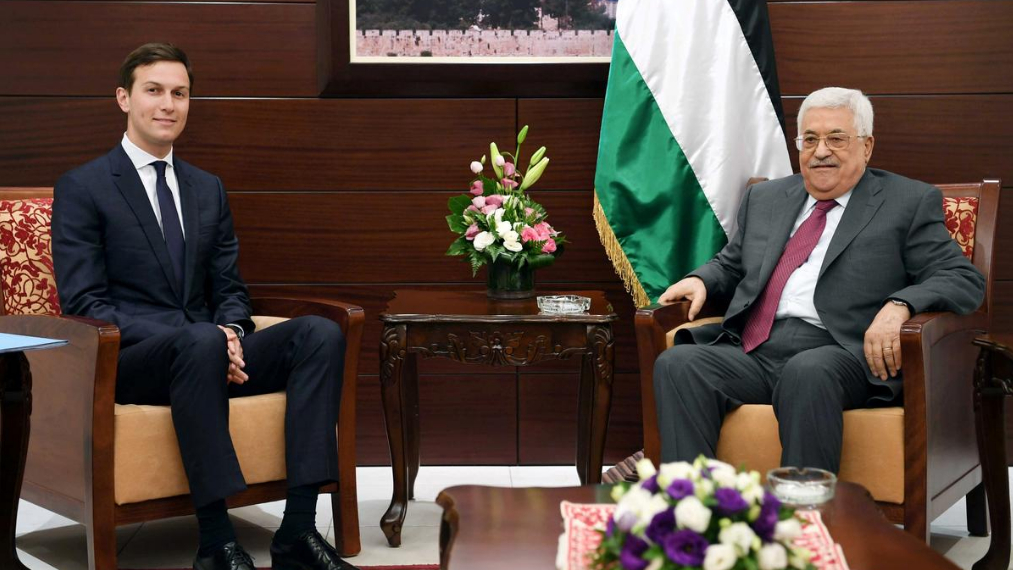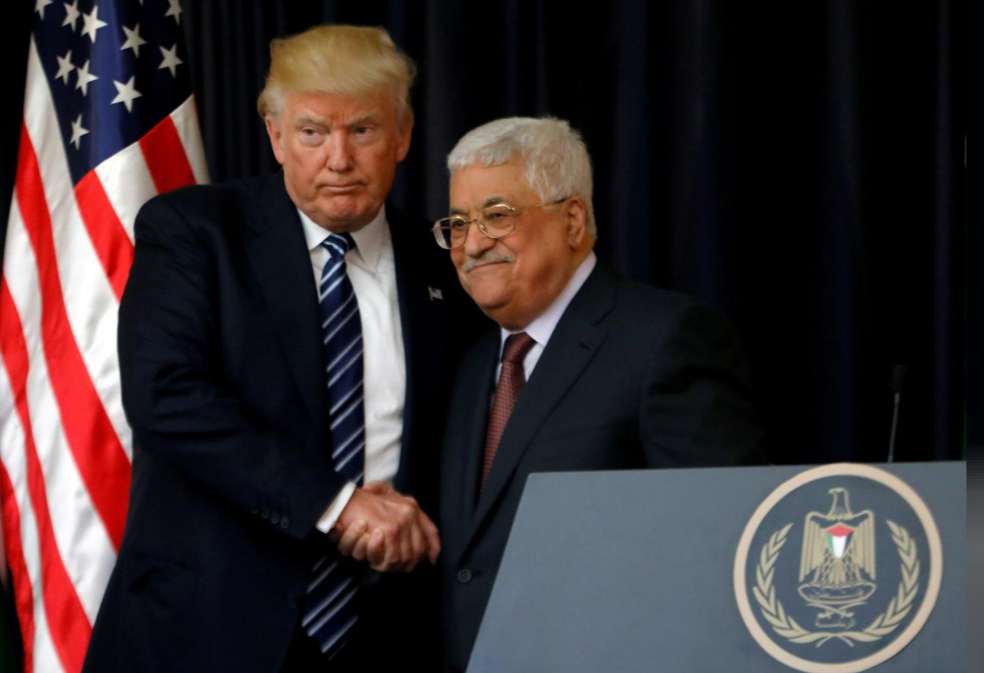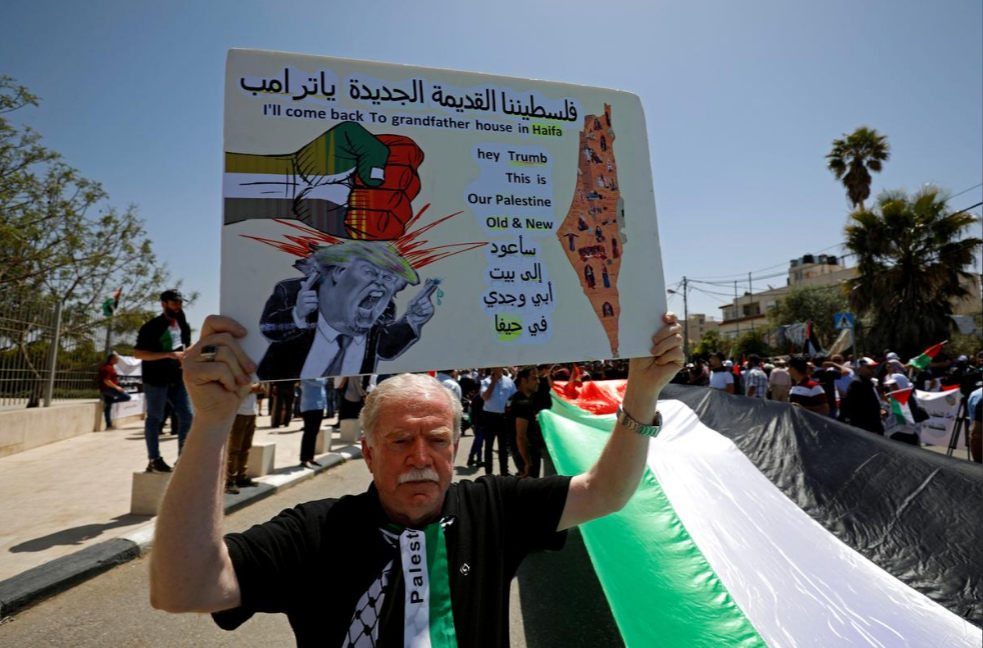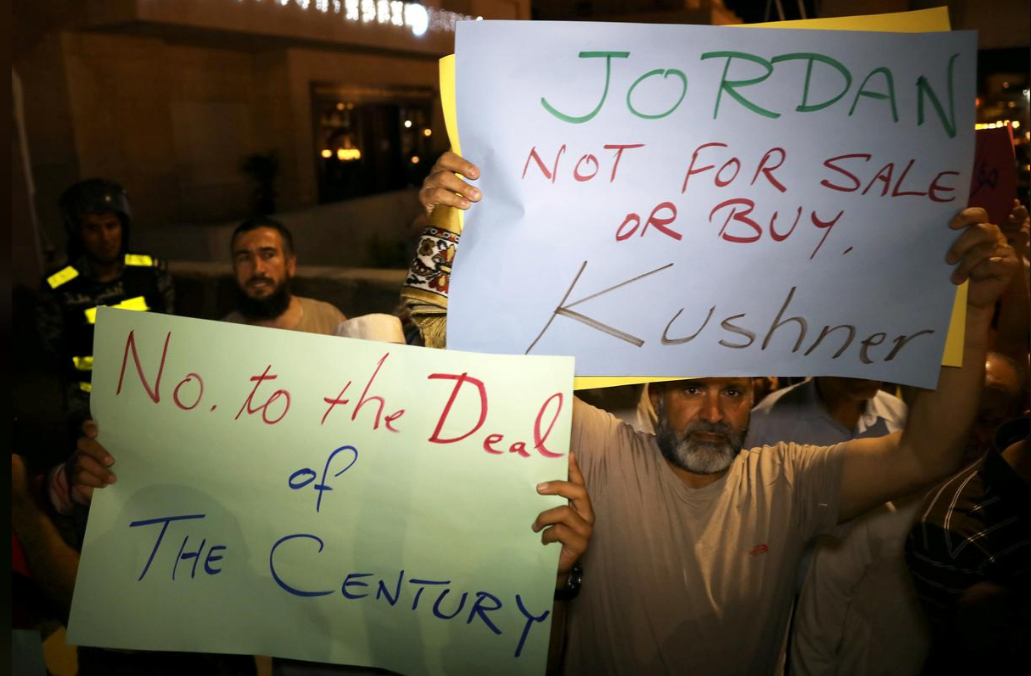
Middle East
10:58, 01-Jun-2019
Palestinian president says U.S. Deal of the Century can 'go to hell'
CGTN

The U.S. blueprint to end the conflict between Israel and the Palestinians, still in draft form after almost two years, is seen by Palestinians and by some Arab officials and politicians as a plan to finish off the Palestinian cause.
Speaking earlier this week at an event honoring donors to the Mahmoud Abbas Foundation in an address that was aired on Palestine TV on May 27, Palestinian President Mahmoud Abbas said that "May the Deal of the Century - the deal of shame - go to hell."
He also told attendees that the Palestinians will not accept the results of the Bahrain meeting, even if they appear to be in the Palestinians' favor.
The initiative, driven by Jared Kushner, Donald Trump's son-in-law and White House adviser, was billed by the U.S. president as the "Deal of the Century."
While its precise outlines are yet to be revealed, Palestinian and Arab sources who have been briefed on the draft plan say Kushner has jettisoned the two-state solution, the long-standing U.S. and international formula that envisages an independent Palestinian state alongside Israel in the West Bank, east Jerusalem and Gaza.

U.S. President Donald Trump shakes hands with Palestinian President Mahmoud Abbas during a joint press conference in Washington, May 23, 2017. /Reuters Photo
U.S. President Donald Trump shakes hands with Palestinian President Mahmoud Abbas during a joint press conference in Washington, May 23, 2017. /Reuters Photo
After several postponements, Washington plans a first formal outing of the economic components of the plan at a "Peace for Prosperity" workshop in June in Bahrain.
Kushner and Trump, with backgrounds in real estate rather than diplomacy, seem to be approaching this hitherto insoluble conflict as a transaction, three Arab officials briefed on the plan said.
If the politics keep failing, the reasoning seems to be, then try dangling tens of billions of dollars before the Palestinians and Israel's Arab neighbors, and do a deal that could unlock prosperity for the Palestinians and security for Israel, the officials said.
Politically, the deal envisages an expansion of Gaza into part of northern Egypt, under Egyptian control, Palestinian officials briefed on the plan told Reuters. Palestinians would be left with a smaller share of the West Bank and some areas on the outskirts of Jerusalem and no control over their borders. Western and Arab sources confirmed the outline of the plan.
Jason Greenblatt, Trump's Middle East envoy, said "rumors" about an expansion into Egypt's Sinai desert were false. He declined to give details of the political plan before it is released.
On the decision not to use the term "two-state solution," Grenblatt said: "We believe that using certain phrases and labels is not helpful because they lack detail and nuance; they mean different things to different people. The detailed plan, once released, will show what we think may be the best solution for the two parties."
Not buying it

Palestinian demonstrators burn a poster of U.S. President Donald Trump, Hebron, West Bank, February 22, 2019. /Reuters Photo
Palestinian demonstrators burn a poster of U.S. President Donald Trump, Hebron, West Bank, February 22, 2019. /Reuters Photo
The Palestinians are not buying it.
"What we're seeing from the plan is that it will blow up the Palestinians," one Arab official told Reuters. "The plan doesn't give justice to the Palestinians."
"The Palestinian cause is being liquidated: no Jerusalem (as capital), no right of return for refugees, no sovereign state. That is why this American project is dangerous," one senior Palestinian leader told Reuters.
The deal as outlined so far has been dismissed by President Mahmoud Abbas' western-backed Palestinian Authority in the Israeli-occupied West Bank.
Abbas has boycotted political dealings with the Trump administration for 18 months. This followed Trump's decisions in 2017 to recognize Jerusalem as Israel's capital and move the U.S. embassy there from Tel Aviv.
Since then, the Trump administration has curtailed aid to the Palestinian Authority, shuttered the Palestine Liberation Organisation (PLO) delegation in Washington and cut off finance to UNRWA, the U.N. agency supporting Palestinian refugees. Washington meanwhile endorsed Israel's sovereignty over the Golan Heights.

A Palestinian demonstrator holds an anti-U.S. sign during a rally, Ramallah, West Bank, May 15, 2019. /Reuters Photo
A Palestinian demonstrator holds an anti-U.S. sign during a rally, Ramallah, West Bank, May 15, 2019. /Reuters Photo
"In practice they have already started implementing the 'Deal of the Century'," the senior Palestinian leader said. "Today, the two-state solution has been scuttled."
"We will not accept this meeting and its results, because they are selling us illusions, and because whoever wants to solve the Palestinian issue should start with the political issue, and afterwards deal with the political issue some more and then some more," Abbas said in a TV show. "Only then may they talk about the illusion of the billions that they claim they will give us. Let us tell you, none of that money will ever arrive."
Abbas is not alone in his view of the U.S. deal.
It was rejected by the Islamist Hamas movement, which does not recognize Israel's right to exist and has only given conditional consent to a state in the occupied Palestinian territories.
The Palestine Liberation Organization (PLO) has dismissed the Kushner effort as an attempt to bribe Palestinians into accepting Israeli occupation of the West Bank, a prelude to Israel annexing about half their territory and leaving them with scattered cantons.

Members of the Muslim Brotherhood take part in a sit-in against senior White House adviser Jared Kushner's visitor to Jordan in Amman, Jordan, May 28, 2019. /Reuters Photo
Members of the Muslim Brotherhood take part in a sit-in against senior White House adviser Jared Kushner's visitor to Jordan in Amman, Jordan, May 28, 2019. /Reuters Photo
Hanan Ashrawi, a moderate Palestinian leader, tweeted that the Kushner plan and the Bahrain conference were just "a handout to make our captivity palatable."
Palestinian businessmen have opposed the Bahrain gathering despite a plea by Washington to attend, saying their political demands must be addressed in any peace plan.
Qatar said economic prosperity cannot be achieved without political solutions acceptable to Palestinians. Oman said anything that precludes the establishment of a Palestinian state will not be acceptable.
"We are not proposing an economic peace," Greenblatt said. "We know that is not acceptable to the Palestinians. We've been very clear that the full plan includes a political component as well. But the economic plan is an essential component to the full plan."
According to Dr. Muriel Asseburg, a senior fellow in German Institute for International and Security Affairs, the American "Deal of the Century" is unlikely to contribute meaningfully to resolving the Israel-Palestine conflict. Instead it risks further escalating an already tense situation and accelerating the erosion of joint conflict management.
She believes even under strong pressure, the Palestinian leadership cannot be expected to agree to the U.S. approach.
(With inputs from Reuters)

SITEMAP
Copyright © 2018 CGTN. Beijing ICP prepared NO.16065310-3
Copyright © 2018 CGTN. Beijing ICP prepared NO.16065310-3